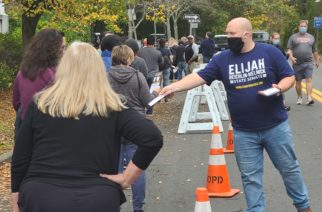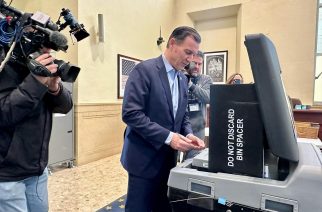
As per the executive order, the Commissioner of the Department of Corrections and Community Supervision will submit records for individuals released from prison in the prior month beginning on May 1, 2018 for review.
New York will restore the right to vote to upwards of 35,000 New York parolees who have served time for felonies, after an executive order was signed by Gov. Andrew Cuomo on Wednesday.
Under the order, New York will join a list of 14 other states and the District of Columbia, all of which have reinstated voting rights to convicted felons following their release from incarceration. State law previously allowed convicted felons to vote only after their prison sentence and parole were both completed.
Allies to the governor and voting rights activists applauded the plan, while opponents — both within the party and in the GOP — decried the move as political showboating and legally unsound for circumventing the Legislature.
While addressing the executive order, Cuomo highlighted the disenfranchisement of thousand of voters — particularly African Americans and Hispanics, who make up 71 percent of the roughly 35,000 parolees — as a reason behind his action.
“It is unconscionable to deny voting rights to New Yorkers who have paid their debt and have re-entered society,” Cuomo said regarding his executive order. “This reform will reduce disenfranchisement and will help restore justice and fairness to our democratic process. Withholding or delaying voting rights diminishes our democracy.”
The executive order does not immediately reinstate voting rights to all parolees. Instead, beginning May 1, top officials for the New York Department of Corrections will be in charge of reviewing former inmates now under parole supervision. Those officials will then recommend whether or not a pardon — and thus reinstatement of voting rights — is warranted.
A number of organizations and nonprofits, have applauded the executive order, including The Doe Fund, a New York City nonprofit that helps provide housing, employment and other services to over 22,000 formerly homeless and incarcerated individuals. Founder and President George McDonald praised the governor’s move to reinstate voting rights.
“We have seen firsthand what happens when an individual is restored to their rightful place in society–when they can hold down a job, pay their rent, and exercise their rights as a citizen,” McDonald said. “And there simply is no more essential right than the right to vote. The governor’s order represents a crucial step toward ending the cycle of deprivation and disenfranchisement that led many parolees to prison in the first place.”
Yet not everyone is applauding the governor for his latest shift in policy stances.
The move comes as Cuomo faces a primary challenge from “Sex in the City” actress Cynthia Nixon, who has criticized the governor for failing to uphold promises to the liberal wing of the Democratic party over his past two terms. In a statement addressing the executive order, Nixon continued to blast the governor for flip flopping on key issues — including the rights of parolees.
“For eight years, Cuomo governed like a Republican — handing control of our state to his ultra-rich donors and the party of Trump,” Nixon said. “Now he’s scared of communities all across New York who want to replace him with a real Democrat. We don’t buy the governor’s new song-and-dance routine. Voter suppression in New York should have ended eight years ago, from the rights of parolees to access to early voting and automatic registration.”
By signing an executive order on the issue, Cuomo roundly sidestepped the New York Legislature, where Republicans currently control the Senate by a thin majority following the dissolution of the Independent Democratic Conference earlier this month. Republicans in both chambers, including Minority Leader Brian Kolb, R-Canandaigua, criticized Cuomo for circumventing the Legislature.
“Cuomo’s latest political Hail Mary isn’t merely bad policy, it is a direct circumvention of existing law,” Kolb said. “Granting parolees voting rights was never a priority until the governor saw his poll numbers drop and a formidable primary challenger arise.”
“Murderers, rapists and abusers, who made a choice to break the law, don’t deserve to vote until their entire sentences are served — including parole. Unfortunately, the governor is more focused on taking care of criminals, while law-abiding citizens are taxed out of the state and watch their freedoms continue to erode.”
Others — including Assemblyman Anthony Palumbo, R-New Suffolk — threatened a potential legal challenge against the executive order.
“For the Governor to paint every convict and parolee with the same exonerating brush is wrong,” Palumbo said. “I intend to pursue all remedies, including a possible lawsuit and a stay of this executive order.”









